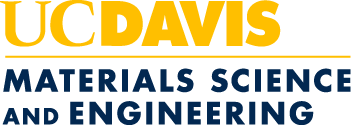Materials Science Alum Wins Jeffery C. Gibeling Master's Thesis Excellence Award
The University of California, Davis, College of Engineering has announced Margaret Duncan as the recipient of the Jeffery C. Gibeling Master's Thesis Excellence Award. Duncan earned her master's degree in materials science and engineering in 2023 under the mentorship of Professor of Materials Science and Engineering Marina Leite.

The annual award is named for Professor Emeritus of Materials Science and Engineering Jeffery Gibeling, who served as the college's interim dean in 2021. It recognizes the master's student who submitted the best master's thesis as well as the mentorship of their major professor.
"I'm very thankful," said Duncan. "It's a true honor to receive this award. I'm also incredibly grateful to all the other amazing scientists I had the privilege to work with during my degree, especially my advisor, Professor Marina Leite, whose mentorship and guidance helped me grow into the researcher I am today."
Duncan's master's thesis, titled "High-Temperature Optics with Refractory Materials," studied the effects of temperature on the optical properties of refractory materials. Refractory materials are a class of high-temperature stable materials that are well known for their physical and thermal stability at high temperatures but whose optical properties have gone unstudied prior to Duncan's research.
Her project was part of a collaborative effort funded by the Defense Advanced Research Projects Agency, or DARPA, which aimed at discovering and developing materials that could work as an optical emitter for thermophotovoltaics to maximize the efficiency of photovoltaic devices.
Under Leite's mentorship, Duncan was responsible for key aspects of the DARPA project, performing material fabrication and optical characterization while primarily using the College of Engineering's Center for Nano-MicroManufacturing to quantify the behavior of each material in varying environments and simulate their optical response.
Duncan, Leite says, is a testament to her program, her college and her university.
"Margaret was an outstanding student who made substantial progress in research on photonics during her time at UC Davis," she said. "Her project is at the forefront of materials science research, and I am very pleased to see that her talent as a researcher has been recognized by the College of Engineering. She is an ambassador of our program — a student with excellent computational and experimental knowledge and exquisite presentation skills."
Duncan's thesis includes an analysis of the optical properties of refractory metals and their oxides, nitrides and carbides, as well as an analysis of their optical and chemical responses to high-temperature experiments and their stability. She also investigated possible applications of each structure, including superabsorption (a material's ability to absorb and retain liquid), thermophotovoltaics for sustainable energy and structural colors, which could be used in anticounterfeit technology or protective coatings for spacecraft circuit boards.
Her dedication, diligence and independence stood out to the project's co-PIs, Leite and Professor of Electrical and Computer Engineering Jeremy Munday.
"She is the kind of student that just gets things done," Munday said. "For example, there was a particular deposition process that we needed for one of the samples [she was working on], but we didn't have the equipment at our university. She searched the internet, made phone calls, and later that day drove down to Stanford to get trained and make the samples. I couldn't believe it."
Duncan's M.S. thesis research has resulted in three papers published in peer-reviewed journals, one of which made the cover of ACS Applied Optical Materials. She has another paper currently in review.
She received the prestigious National Science Foundation Graduate Research Fellowship in 2022. She was awarded special honors for outstanding scholarship and completion of an honors thesis for her bachelor's degree in physics from the University of Texas at Austin.
Duncan now uses the experimental and computational materials characterization techniques she learned in her graduate program as a research scientist at the technology company Ashwin-Ushas Corporation on projects that range from detecting hazardous chemicals to improving the efficiency of spacecraft heating shields.
